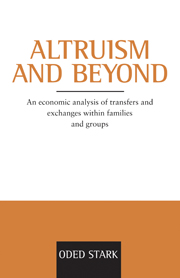Book contents
- Frontmatter
- Contents
- Preface
- Introduction
- 1 Altruism, transfers, and wellbeing
- 2 The timing of intergenerational transfers: an implication
- 3 An exchange implication of transfers: the demonstration effect
- 4 Transfers by migrants: a strategic motive for remittances
- 5 Exchange with recognition costs: an explanation of migrants' performance
- 6 Intrafamilial transfers and exchanges: forming and sustaining altruism
- Index
6 - Intrafamilial transfers and exchanges: forming and sustaining altruism
Published online by Cambridge University Press: 23 September 2009
- Frontmatter
- Contents
- Preface
- Introduction
- 1 Altruism, transfers, and wellbeing
- 2 The timing of intergenerational transfers: an implication
- 3 An exchange implication of transfers: the demonstration effect
- 4 Transfers by migrants: a strategic motive for remittances
- 5 Exchange with recognition costs: an explanation of migrants' performance
- 6 Intrafamilial transfers and exchanges: forming and sustaining altruism
- Index
Summary
Introduction
A plausible evolutionary argument for selfishness would assert that if natural selection favors those who receive high payoffs, and if altruists get lower payoffs than selfish individuals, then evolution will tend to eliminate altruists. In this chapter, we will show that, paradoxically, evolution can sustain cooperative behavior between relatives even in single-shot prisoner's dilemma models, where cooperation benefits one's opponent at a cost to oneself.
We consider two-player, two-strategy games in which a player who cooperates gets a payoff of R if his or her opponent cooperates, and S if the opponent defects. A player who defects gets T if his or her opponent cooperates, and P if the opponent defects. In a prisoner's dilemma game, S < P < R < T, so that defection is a dominant strategy for each player, and S + T < 2R, so that total payoffs are maximized when both cooperate. An individual's strategy is determined either by genetic inheritance or by imitating the behavior of parents or nonparents.
The evolution of genetically-transmitted behavior toward siblings
Not much is known about the environments that shaped our genes, and most economists do not believe that evolutionary hypotheses can explain human preferences. But since the fundamentals of mating, childrearing, and sibling relations have changed little over the millennia, we believe that evolutionary theory can enrich the study of the economics of the family.
- Type
- Chapter
- Information
- Altruism and BeyondAn Economic Analysis of Transfers and Exchanges within Families and Groups, pp. 121 - 138Publisher: Cambridge University PressPrint publication year: 1995
- 1
- Cited by

